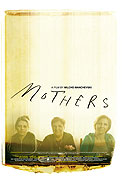Ohjaus:
Milcho ManchevskiKuvaus:
Vladimir SamoilovskiSävellys:
Igor Vasilev NovogradskaNäyttelijät:
Ana Stojanovska, Vladimir Jacev, Dimitar Gjorgjievski, Salaetin Bilal, Ratka Radmanovic, Petar Mircevski, Blagoja Spirkovski-Dzumerko (lisää)Juonikuvaukset(1)
A triptych from Macedonia. In part one, two nine-year-old girls addicted to mobile phones go to the police claiming they have seen an exhibitionist. Part two focuses on young documentary filmmakers making a film about the last two survivors in a remote village – a brother and sister who have not spoken to each other in 16 years. Part three tells the story of the evil next door: several elderly cleaners – all mothers – have been raped and murdered. A reporter writes about the crimes and is then arrested.
What links the three stories? Something that begins as fiction becomes a documentary as the film progresses. MAJKI is not a film about truth, but about the nature of truth. Milcho Manchevski: "All three stories in this film are true. They are not only based on real events, but they often follow actions and dialogue verbatim, as they happened. One of the stories is a documentary. Yet we don't know more about what happens in reality. If anything, the truth in the documentary is more elusive, even confusing. In a traditional structuralist manner, the structure of MAJKI itself (two parts fiction and one part documentary) becomes part of its message. A writer once said: 'Of course reality is stranger than fiction. Fiction has to make sense.'" (Production notes)
(Berlinale)
Arvostelut (1)
Pleasant surprise. The synopsis made me expect some sort of trendy story puzzle (Iñárritu style), but Mothers turned out to be an anthology film. The first story (Exhibitionist) is the shortest, it plays on an amusing note, but you can feel something rotten beneath. The second story is about a trio of documentarist that go to shoot a documentary in the Macedonian countryside. Here’s when the film is at its best, one moment you are laughing and a second later you feel like crying. The third story, a documentary about murders in Kičevo, is the longest, which may be a pity considering the emotions the second story aroused in me. But overall, it’s a very nice probe into an amazing society from Southern Europe. (6.3. Cinema Mundi 2011)
()

